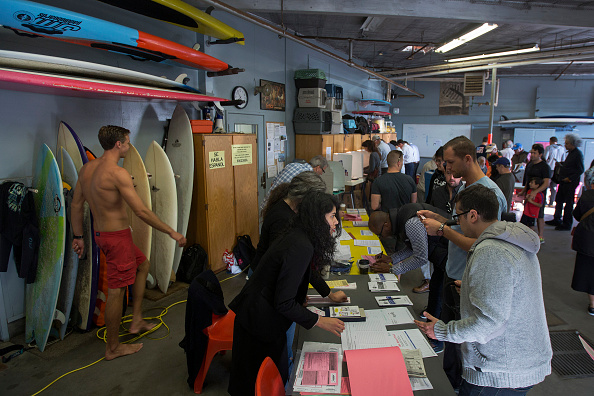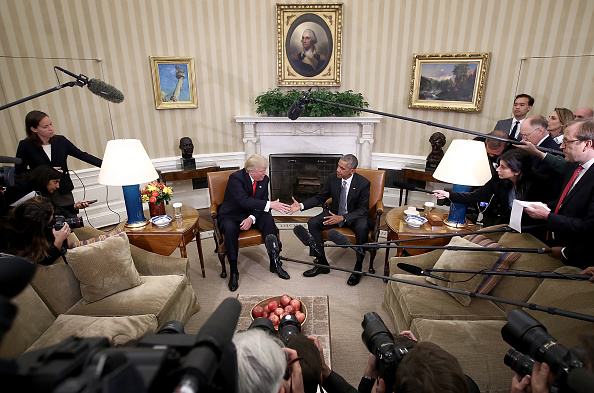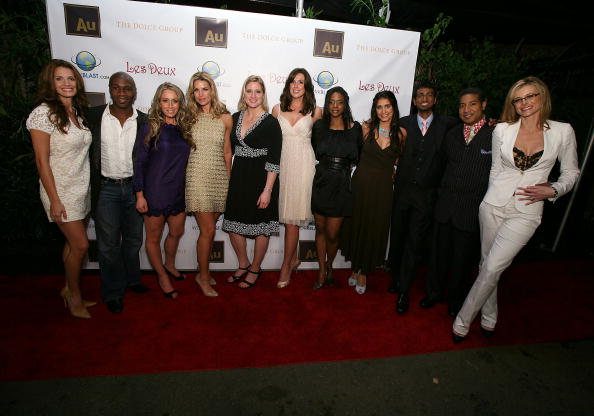A Romanian friend and I were talking the other day about the campaign for the 2024 Summer Olympics.
If Paris wins, he said, it will be a thoroughly French Olympics. But if it's Los Angeles — that, he said, would be an international Games with the potential to prove truly transformational for the Olympic movement in the 21st century.
Maybe Tuesday’s election of Donald J. Trump has changed everything.
Or maybe — actually, probably — it has changed nothing.
Take a deep breath. Things tend to work out.
Are there any guarantees? No. Promises? No. But that’s not the way life is. And, again, things tend to work out.
Did Trump say all kinds of rude, belittling and worse things during the campaign? Absolutely. Since his election, has he struck a more conciliatory, encompassing tone? For sure. On Thursday at the White House, he met with President Barack Obama, the president saying, “I want to emphasize to you, Mr. President-elect, that we are now going to want to do everything we can to help you succeed because if you succeed, then the country succeeds.”
The last time this sort of weirdness settled over a significant portion of the United States if not beyond, it was January 1981, and Ronald Reagan, a former movie star, was being inaugurated. We all lived through that. Indeed, Reagan was president during the 1984 Summer Games in LA, which all but saved the movement. How much did he personally have to do with those Games? Very little.
If you stop and pause for just a moment, it’s actually quite possible a Trump presidency could be good for the Los Angeles 2024 bid. The committee issued a statement Wednesday that congratulated the president-elect, noted the bid’s “strong bipartisan support at the local, state and federal level” and said it was looking forward to working with Trump to “deliver a ‘new games for a new era.’ “
OK, good PR move. Even so, the Olympics, and particularly the bid process, is all about connections. Here’s what that statement didn’t — couldn’t — say:
Angela Ruggiero, the U.S. women’s ice hockey star, is now chair of the International Olympic Committee’s athletes’ commission. She is also a former contestant on “The Apprentice,” the TV show that Trump starred in for years. Trump was so impressed with her that, afterward, he offered her a job.
So — now the IOC has a direct conduit to the president-elect of the United States. What more do you want?
IOC president Thomas Bach on Wednesday offered a brief statement to Associated Press that said, “Let me congratulate President-elect Trump on his victory and wish him all the best for his term in office for all the people of the United States and of the world.”
Would it have been “better” for the American 2024 effort if Hillary Clinton had prevailed in the electoral college as well as the popular vote?
To be sure, she was, in Olympic circles, something of a known quantity. She led the U.S. delegation to the 1994 Lillehammer Games. She and President Bill Clinton led the American side in Atlanta in 1996. When the 2012 Games campaign was going on, Hillary Clinton, then a senator from New York, traveled to the IOC session in Singapore to lobby for New York.
No disrespect intended whatsoever to Mrs. Clinton but New York got crushed and Atlanta is hardly remembered fondly in many senior Olympic circles.
At any rate, there’s little question that California wanted Hillary. The state went for Mrs. Clinton by roughly 2-1, 61 to 33 percent. The U.S. Olympic Committee turned to LA for 2024 for a variety of reasons — one of which is precisely that California is different, about as far away from Washington, D.C., another potential 2024 candidate, as possible. Far away -- literally and figuratively.
Reflecting on Trump’s election, Stanford political science professor Bruce Cain told the New York Times, referring to California, “We will go back into the mode that we were in during the Bush administration,” meaning George W. Bush, “which is we were the kind of the rebel state.”
We got through the Bush years, too, it should be pointed out. The American experiment did not collapse in on itself. For what it's worth, Bush is a huge proponent of the Olympics, traveling to Beijing in 2008 to watch Michael Phelps and the rest of the U.S. team after opening the 2002 Winter Games in Salt Lake City.
At any rate, who is the former governor of California? Arnold Schwarzenegger. We all lived through that, too.
Who is replacing Trump as host of the successor show “The Celebrity Apprentice,” his debut set for January 2017, just a few days before Trump is due to be inaugurated as president? Schwarzenegger.
People, the world turns in mysterious ways.
Here are some factors that remain immutable:
-- The United States is not Russia nor China, where the strong hand of the national government plays a key Olympic role.
— As the IOC well knows, western governments have a rude habit of change in the seven years between the time a city wins the Games and the opening ceremony. See, for instance, Brazil, the United Kingdom, Greece, Japan and others, including South Korea, site of the 2018 Winter Games, where hundreds of thousands are expected this weekend in the streets in protest against the current president.
And, for that matter, the United States.
Who knows whether Trump would even still be president in 2024?
— The recent demise of the Rome 2024 bid proves emphatically that the mayor — who killed off that bid despite national government and Olympic committee support — is more important in the Olympic bid process than anyone at the national level.
LA mayor Eric Garcetti is a rock star. Indeed, with Clinton’s defeat, a loss that simultaneously made plain how few young Democratic stars there are, Garcetti is uniquely positioned to assume an even more prominent profile.
What tends to win Olympic votes is connection and relationship. The USOC chairman, Larry Probst, and chief executive, Scott Blackmun, along with Ruggiero and longtime IOC member Anita DeFrantz have spent the past several years seeking just that. Along with, now, Garcetti and LA 24 bid leader Casey Wasserman.
For all this, if you were the bid committees in Paris and Budapest, the two remaining 2024 candidates, you might well be feeling suddenly frisky at the prospect of a Trump presidency.
To be super-American about this, and quote Lee Corso, the former American college football coach turned ESPN television personality: not so fast, my friend.
One way to interpret Tuesday’s result is that it makes for a rebuke of multiculturalism and globalization — the very things purportedly at the core of the Olympic soul. If that’s the way the IOC ends up looking at it, that’s going to be very tough for the LA effort. Or, simply put, if the members want to punish the United States for its choice of president -- see Bush 43 -- that's going to be tough, too.
Perhaps, though — “drain the swamp” and all that — it’s more a rejection of Washington and its elites, and by extension global elites. Look, there is no bunch more perceived as a bunch of global elites more than the IOC, a point proven repeatedly in recent months and years with western European rejection of bids in — deep breath — Munich, Hamburg, Stockholm, Oslo, Krakow, St. Moritz, Vienna and, now, Rome.
This is a matter about which the IOC ought to be paying rapt attention. Its increasingly urgent mandate: to remain relevant in our obviously changing world.
So American voters just elected a rhetoric-spewing avowed nationalist?
This bears all the signals of the second act in a global three-act play.
Act One: Brexit. To put an Olympic spin on it, the British vote to leave the European Union came in the aftermath of what many consider the finest Summer Games in recent memory, in London in 2012.
Two: Trump.
Three: next year’s presidential election in France. Would anyone be surprised if the third domino fell, with the candidacy of Marine Le Pen?
Her tweet Tuesday, even before all the votes had been counted stateside:
https://twitter.com/MLP_officiel/status/796235915387699200
Translation: “Congratulations to the new U.S. president Donald Trump and to the free American people.”
As for Hungary:
This past summer, Hungarian prime minister Viktor Orbán said, referring to Trump, that the ideas of the “upstanding American presidential candidate” and his opposition to “democracy export” could also apply in Europe. Orbán, who has ordered fences built at the Hungarian border in a bid to stop migrants, also said in July, “I am not Donald Trump’s campaigner,” adding, “I myself could not have drawn up better what Europe needs.”
Amid the Trump victory, here was Orbán on Facebook:
Then, speaking Thursday at a European conference, he echoed, “We are two days after the big bang and still alive. What a wonderful world. This also shows that democracy is creative and innovative.”
In even more-important news within the Olympic bubble, the government is due Jan. 1 to take over much of the authority of the Hungarian Olympic Committee. The IOC has long frowned on such intrusions in what it likes to call “autonomy,” meaning appropriate independence from government.
France is not Hungary. But with the French Olympic committee comes a big dose of French government. That's the way things are.
That’s the farthest thing from an issue in the United States. By 1978 law, Congress maintains USOC oversight. But the USOC must run and fund itself.
If all this makes anyone squirm about the rise of “populism” if not nationalism, if there is suddenly a tinge of forlorn regret for the Obama years, let’s have — once more — an Olympic reality check.
Copenhagen, 2009. The president is the new winner of the Nobel Peace Prize. He comes to Denmark to lobby for his hometown, Chicago, in the race for the 2016 Games. Chicago gets kicked to the curb in the first round, with fewer votes even than New York got four years before.
“… I think we’ve learned,” the president said in an interview published last month in New York magazine, “that [the] IOC’s decisions are similar to FIFA’s decisions: a little bit cooked. We didn’t even make the first cut, despite the fact that, by all the objective metrics, the American bid was the best.”
Coincidence or not: since then, it’s Obama’s Justice Department that has gone after FIFA and has opened a criminal investigation into allegations of state-sponsored Russian doping. Coincidence or not: Loretta Lynch, the former head of Justice’s Eastern District of New York, the office that is leading the charge, is now the attorney general of the United States. She reports to Obama.
It was Obama, recall, who opted to make a political statement in advance of the 2014 Sochi Games by sending a U.S. delegation that was to be headed by the tennis star Billie Jean King and two other athletes. King had to bow out of the opening ceremony delegation because of her mother’s death; she later made it to the closing ceremony.
In three years as IOC president, Bach has met with more than 100 heads of government and state. A notable exception: Obama.
Politicians come and go. That is a vivid lesson of Olympic history. The issue that matters is elemental: where is the best place for the Olympic movement to reimagine its future? That starts with 2024.
Ask your kids.
If you can get them away from their election chatter — and how it’s going to impact their lives, the very currency with the very audience the IOC is chasing — on Snapchat.
Snapchat — which of course is based in the hipster LA neighborhood of Venice Beach.




